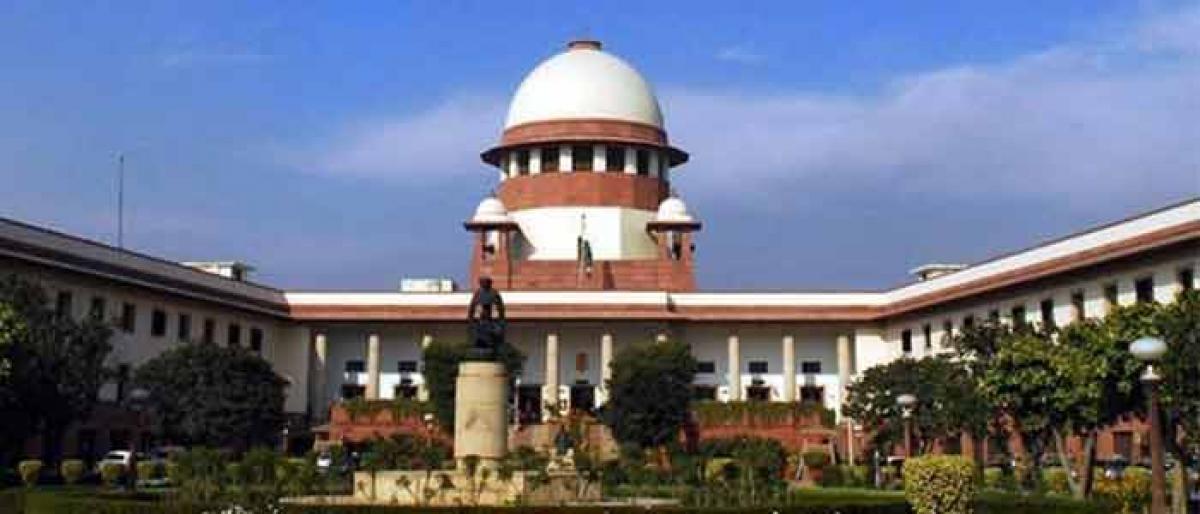Live
- Sisodia not to report to police twice a week: SC
- No possibility of alliance with Cong for Delhi polls: Kejriwal
- Marriage an integral part of life: Top court enhances compensation to road accident victim
- 8,31L farmers get skill training in AP
- CM: Bypass to be constructed to decongest traffic in Kurukshetra
- Harassed by police, leader commits suicide in Baran
- Sikh preacher Dhadrianwale booked for rape, murder
- AI-powered digital initiatives at RGIA
- Yogi’s efforts revive Nagvasuki Temple ahead of Maha Kumbh
- Delhi drowning deaths : HC seeks CBI reply over interim bail to coaching centre officials
Just In

In a much-awaited verdict on the 126-year-old Cauvery water dispute, the Supreme Court on Friday directed Karnataka to release 177.25 tmcft of water to Tamil Nadu from its interstate Biligundlu dam, thereby increasing the share of Karnataka by 14.75 tmcft.
New Delhi: In a much-awaited verdict on the 126-year-old Cauvery water dispute, the Supreme Court on Friday directed Karnataka to release 177.25 tmcft of water to Tamil Nadu from its interstate Biligundlu dam, thereby increasing the share of Karnataka by 14.75 tmcft.
The court made it clear that increase in share of Cauvery water for Karnataka has been done keeping in view the fact that there is an increased demand of drinking water by Bengaluru and also for many industrial activities. The court said that its order on Cauvery water allocation would continue for next 15 years.
The judgement clarified Tamil Nadu will now get 404.25 tmcft water, which will be 14.75 tmcft less than what was allotted by the tribunal in 2007. Karnataka, which earlier had a share of 270 tmcft of Cauvery water, in accordance with the 2007 award of the Cauvery water dispute tribunal will now get 284.75 tmcft.
In its order, the Supreme Court said, “The waters of an interstate river passing through the corridors of the riparian states constitute national asset and cannot be said to be located in any one state. Being in a state of flow, no state can claim exclusive ownership of such waters or assert a prescriptive right so as to deprive the other states of their equitable share.”
The court has ordered the formation of the Cauvery Management Board (CMB), that will ensure the allocation of water is implemented properly. The Supreme also allowed Tamil Nadu to draw an additional 10 tmcft 'groundwater' from a total of 20 tmcft beneath the Cauvery basin.
The apex court further said the 2007 tribunal award of 30 tmcft to Kerala and 7 tmcft water to Puducherry will remain unchanged. A three-judge Bench of Chief Justices Dipak Misra and Justices Amitav Roy and AM Khanwilkar had reserved judgment on September 20, 2017 on appeals against the Cauvery Disputes Tribunal's final award of February 2007 on allocation of water for Tamil Nadu, Karnataka and Kerala and Union Territory of Puducherry.
Karnataka and Tamil Nadu had approached the Supreme Court after the Cauvery River Water Dispute Tribunal, in 2007, awarded yearly allocation of 419 tmcft to Tamil Nadu in the entire Cauvery basin, 270 tmcft to Karnataka, 30 tmcft to Kerala and 7 tmcft to Puducherry.
While it took nearly two decades for the Tribunal to render its final decision in 2007, it has taken a decade for the case to conclude in the cross appeals against the award filed by the states of Tamil Nadu, Karnataka and Kerala.
Karnataka welcomed the verdict terming it as a "balanced" one which protects the interest of both the states. "This is a good judgement which will go long way in ensuring peace in both the states," Mohan V Katarki, counsel for the state of Karnataka said.
On the other hand, Tamil Nadu expressed its unhappiness over the verdict. "We believe in the verdict of the court and respect it. Surely, this is not enough. We have raised the shortfall of water with Union Minister Nitin Gadkari who have two plans to address the issue, one of which is linking river Godavari with Kallanai," lawyer for Tamil Nadu, A Navaneethakrishnan said.
"In a way, this is a historical judgment where the apex court has said no state can claim ownership over a river. The Central government should now nationalise the rivers," PR Pandian, a farmer leader said. He said though the reduction in Tamil Nadu's share of water would impact the farmlands in the state's Cauvery delta region, the Central government should take steps to implement the judgment and see that Tamil Nadu gets its share of water. The verdict could be an eye-opener for all inter-State river disputes.
The Supreme Court doesn't buy the Centre's argument that it was Parliament's call to finalise the water sharing scheme under the Inter-State Water Disputes Act of 1956.
The Bench said it was wrong on the part of Karnataka to argue they had no bargaining power in the 1892 and 1924 agreements on the Cauvery water allocation between Mysore and the Madras Presidency. "Then why did they not denounce these agreements post Indepedence and the Constitution" it asked.
Karnataka had argued that according to Article 363, the judiciary has no power to intervene in treaties or agreements entered into before the Constitution came into existence.

© 2024 Hyderabad Media House Limited/The Hans India. All rights reserved. Powered by hocalwire.com







